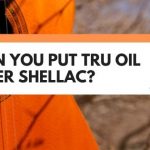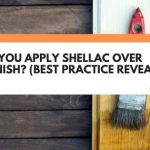You always need to thin shellac first if you want this finish to have the right consistency.
If you don’t, it’ll be too thick for a wooden surface and will coat on unevenly, (as this stuff is meant to be applied thinly).
Now, when it comes to finishes such as lacquer, mineral spirits can easily thin them out.
Related Post: Can You Put A Durable Lacquer Finish Over Shellac?
But, what if you wanted to try thinning shellac with mineral spirits too?
While mineral spirits can thin lacquers and even varnish, this petroleum product will not thin shellac. If you want to thin shellac, you need to use alcohol to cut it.
Denatured alcohol, (also known as methylated spirits in commonwealth countries like the UK, Australia and Canada), is what you should be using to thin out shellac.
However, denatured alcohol can sometimes be tricky to find at your local store. And in some places, this particular product is completely banned from retail.
So, what can you do if you can’t get your hands on denatured alcohol at all? Or maybe it’s banned from sale in your state or country. What are your alternatives?
Well, in this post, we reveal the 2 best substitutes you can use in place of denatured alcohol. You will also discover why mineral sprits simply don’t cut it when it comes to cutting shellac.
What’s more, you will learn why even paint thinners just don’t seem to work when it comes to dissolving those shellac flakes…
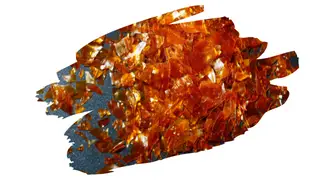
This post may contain affiliate links to products that we receive a commission for (at no additional cost to you). Learn more here.
First Off, What Exactly Should You Use To Thin Shellac?
You should be using anything that contains a lot of ethyl alcohol. This alcohol is the type that comes from fermented plants (i.e. the same stuff found in beer and wine).
However, you need something that is as close to pure alcohol as possible. We are talking 95% proof or higher.
Which is why denatured alcohol is recommended so often. This particular stuff is a touch over 95% proof – which is high enough to break down those shellac flakes.
But, What Can You Use Instead Of Denatured Alcohol (For Thinning Shellac)?
You can substitute other types of alcohol products that also contain a high percentage of alcohol.
For example, butyl alcohol (which is a laboratory grade spirit) is 98% proof.
Methanol, (a heavy duty industrial grade spirit that can even be used as washer fluid), contains 99.95% proof.
Butyl and Methanol (if you can get them) will make ideal alternatives to denatured.
Related Post: Can You Apply Epoxy Over Shellac? (3 Key Things You Need To Know)
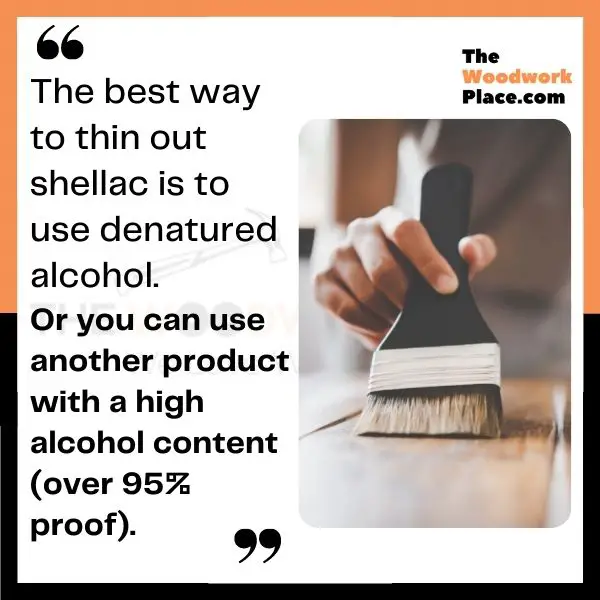
What Does Denatured Alcohol Actually Do To Shellac Anyway?
It dissolves shellac flakes and thins out this particular wood finish – prepping it for application onto timber furniture.
It can also be used to remove an old shellac finish – allowing you to get back down to bare wood to refinish it.
OK, What’s The Difference Between Denatured Alcohol And Mineral Spirits?
Denatured alcohol is made from the consumable ethyl alcohol. However, denatured alcohol has other chemical additives thrown into the mix (which is why it is not fit for drinking at all).
Mineral spirits, on the other hand, comes wholly from petroleum distillate. Which makes it a solvent-based chemical substance.
Related Post: Why Do Mineral Spirits Sometimes Leave Behind A Residue? (Revealed!)
So, Mineral Spirits Really Can’t Be Used Instead Of Denatured Alcohol?
When it comes to thinning out a finish in general? Mineral spirits work on a lot of substances.
In particular, it can easily thin out polyurethane. And mineral spirits can be used to remove nitrocellulose lacquer and acrylic paints.
However, when it comes to shellac, this naturally sourced wood finish doesn’t much react with petroleum. Only alcohol can cut shellac down to size.
Related Post: Can You Apply Shellac Over Varnish? (Best Practice Revealed!)
What Is The Best Denatured Alcohol For Shellac?
If you do decide on using denatured alcohol, then make sure you get your hands on a quality product. Ideally, one that hasn’t been blended with a bunch of other things (that reduce it’s overall alcohol content).
For example, Klean Strip’s Denatured product is 95% natural ethanol, it’s odorless, and it will happily dissolve those shellac flakes in a pinch.
You can check out the latest prices for it over on Amazon.com right here.
Related Post: Drying Wood Slices With Denatured Alcohol (What You Should Know)
There’s No Denatured Alcohol Sold Where I Live. Can Isopropyl Alcohol Be Used To Dissolve Shellac Instead?
No, this stuff won’t help you because it simply doesn’t have enough alcohol in it.
Isopropyl alcohol, (also known as surgical spirit or rubbing alcohol), isn’t pure enough to easily dissolve shellac. That is because it only contains around 70% alcohol. And the rest of that 30% content is mostly made up of water.
Remember, you need something that is 95% proof (or higher) for it to really work on shellac.
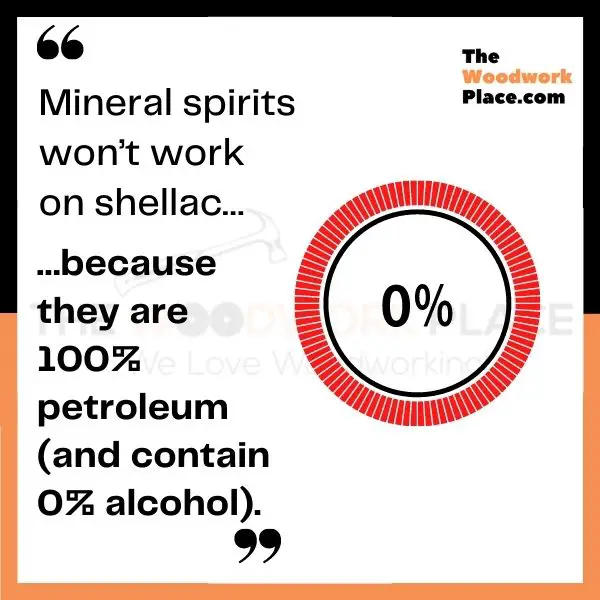
I Have Some Acetone. Is Acetone A Good Denatured Alcohol Alternative For Thinning Shellac?
No, at best Acetone might (and this is a very weak might) soften a shellac finish. This is because Acetone doesn’t contain alcohol.
Instead, acetone is what is referred to as a simple ketone-based solvent.
What About Paint Thinner? Will Lacquer Thinner Or Paint Thinner Dissolve Shellac?
No can do, I’m afraid.
The main ingredient in those lacquer and paint thinners is Acetone, (plus other solvents such as mineral spirits and turpentine).
In other words, they simply do not have an alcohol content high enough (if at all) to work on breaking down those shellac flakes.
So, Here Are Your Three Key Takeaways…
- The best way to thin out shellac is to use denatured alcohol.
- Alternatively, you can substitute denatured alcohol for another product with a high alcohol content (over 95% proof).
- However, mineral spirits won’t work on shellac because they are 100% petroleum (and contain 0% alcohol).


